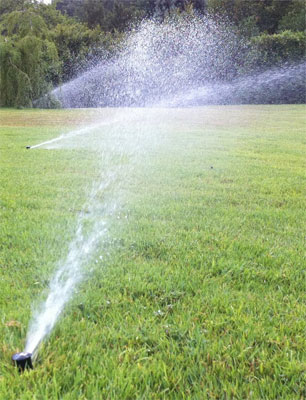Gardening In The Summer Heat
August 6, 2011
When the heat index is well over 100 degrees even avid gardeners are reluctant to work in the landscape. August is a difficult month on both gardeners and plants. So here are a few tips to help you and your garden survive the heat.
 To ensure your bedding plants survive, use plants that love the heat. During hot, humid summers some bedding plants will suffer which will cause them to be routinely replaced. Bedding plants that tolerate this extreme weather include coleus, celosia, gaillardia, marigolds, nicotiana, pentas, portulaca, salvia and zinnia.
To ensure your bedding plants survive, use plants that love the heat. During hot, humid summers some bedding plants will suffer which will cause them to be routinely replaced. Bedding plants that tolerate this extreme weather include coleus, celosia, gaillardia, marigolds, nicotiana, pentas, portulaca, salvia and zinnia.
Don’t over fertilize your lawn. One of the three main ingredients in most fertilizers is nitrogen. Nitrogen makes plants green, but it also makes them grow, especially the lawn. If the lawn turns an off-green, yellow color in the summer, green it up with some iron. Like nitrogen, iron also greens up plants, but does not cause them to grow. Iron will make your lawn look healthy again and it will help to keep your mowing duties to a minimum.
Think about creating a shade garden. Not only do shade gardens provide us with cooler places to garden they also require less care, including less water and less fertilizer. For a list of shade loving landscape plants for North Florida, review an online UF/IFAS publication at http://edis.ifas.ufl.edu/MG252.
 Mulch is a very important element in the landscape. By using an efficient amount of mulch (2-3 inches deep) in planting beds and around trees, it will reduce weed growth, prevent loss of water from the soil by evaporation and keep the soil cool under intense sunlight. Fewer weeds in the landscape results in less work outside in the hot weather.
Mulch is a very important element in the landscape. By using an efficient amount of mulch (2-3 inches deep) in planting beds and around trees, it will reduce weed growth, prevent loss of water from the soil by evaporation and keep the soil cool under intense sunlight. Fewer weeds in the landscape results in less work outside in the hot weather.
Practice efficient irrigation. Some plants require more water than others. Getting the right amount of water to plants is critical. Too much or too less can affect their health. Too much water can lead to disease problems, particularly in lawns. Too little water will cause the plants to slow growth or decline. Usually normal summer rains are enough for most plants; however, if dry periods persist, then supplemental irrigation may be necessary.
Insects can be particularly problematic at this time of year. They’ve had all spring and summer to increase their numbers. Careful, regular scouting for insects is a must. And don’t wait to treat if a problem arises.
Take prompt action to keep the insects from damaging your plants excessively.
 Don’t forget about your own comfort in this weather. Working outside in hot weather places extra stress on the body. Gardeners working outside may lose up to 2 quarts of water each hour. To prevent dehydration, drink water before, during and after working outside. Drink before you’re thirsty and drink cold liquids because they are absorbed by the body faster. If you choose liquids other than water, make sure they contain only a small amount of sugar, as it slows down liquid absorption by the body.
Don’t forget about your own comfort in this weather. Working outside in hot weather places extra stress on the body. Gardeners working outside may lose up to 2 quarts of water each hour. To prevent dehydration, drink water before, during and after working outside. Drink before you’re thirsty and drink cold liquids because they are absorbed by the body faster. If you choose liquids other than water, make sure they contain only a small amount of sugar, as it slows down liquid absorption by the body.
Work in your garden in the early morning or late afternoon when it is cooler and stay in shady areas as much as possible. Follow the shade in your landscape as the sun moves across the sky. Leave areas as they become sunny and move into areas as they become more shaded.
Since we will tend to work in the cooler early morning and evening hours, don’t forget to apply a mosquito repellent. Wear a hat, loose, comfortable clothing and use sun screen. Also, take frequent breaks and try not to stay outside in the heat for extended periods.
Theresa Friday is the Residential Horticulture Extension Agent for Santa Rosa County.



Comments